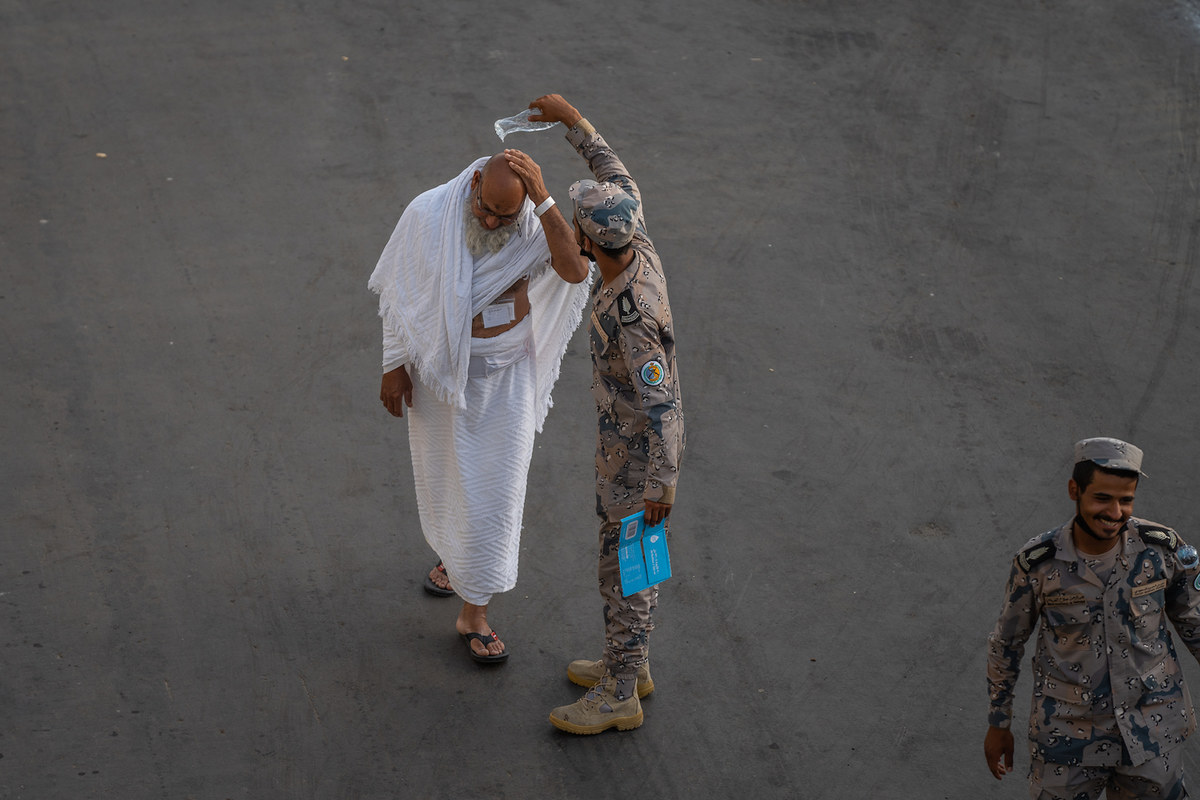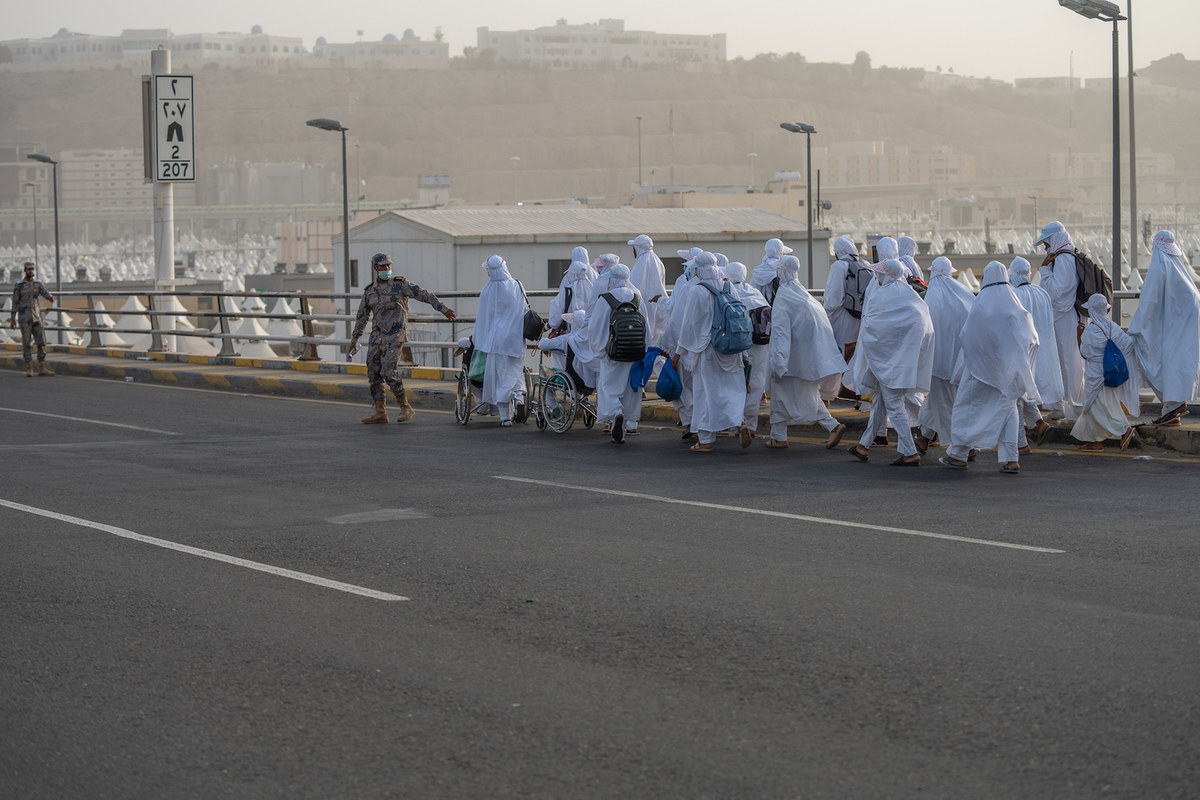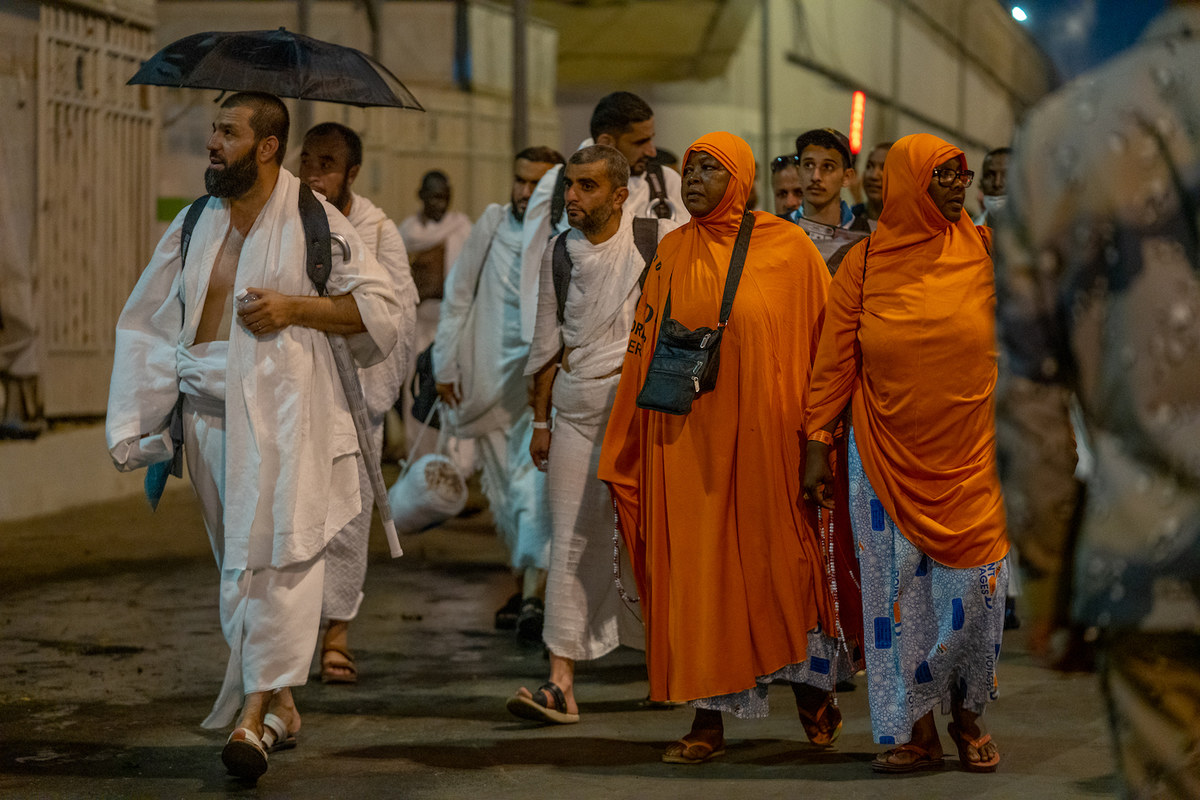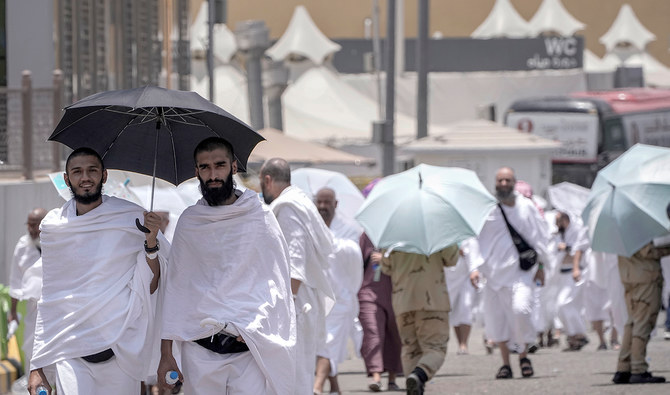MINA: About 2 million pilgrims converged on the tent city of Mina on Monday morning to begin the spiritual journey of a lifetime, as the sacred pilgrimage of Hajj 1444 got underway.
By evening, the site reverberated to the sound of the pilgrims’ reciting Talbiyah, their prayer of intent to perform Hajj for the glory of Allah. Men wearing traditional seamless white cotton garments and women in abayas uttered the words, “Labbaik Allahumma Labbaik (Oh God, here I am answering your call),” as they streamed into the massive site, about 8 kilometers northeast of the Grand Mosque in Makkah.
Following the traditions of the Prophet Muhammad, the pilgrims spent the first day of the pilgrimage, called Tarwiyah Day, engaged in supplications to make amends for their sins. They offered Dhuhr, Asr, Maghreb and Isha prayers, and overnight will make their final preparations before standing before God (wuqoof) on the plains of Mount Arafat on Tuesday.
After the dawn (Fajr) prayer on Tuesday, the pilgrims will leave for Mount Arafat, where the Prophet delivered his final sermon more than 1,400 years ago.
This year marks the return to a full-scale Hajj for the first time since the start of the COVID-19 pandemic and Saudi authorities have put thorough plans in place to ensure the safe and flawless movement of pilgrims. More than 2 million are expected in total, including 1.6 million from other countries.

A member of security sprays water on a Muslim pilgrim upon his arrival in Mina, near Islam's holy city of Mecca on June 26, 2023, during the annual Hajj pilgrimage. (AN Photo by Huda Bashatah)
Those Arab News spoke to had nothing but praise for officials’ efforts to make their Hajj experience as easy, pleasant and spiritual as possible.
Mohammed Hammad, from Nigeria, said: “I really feel great to be closer to the Almighty. This is a good opportunity to interact directly with the Almighty, and pray for good, peace and prosperity.”
Mohammed Nauman, from Afghanistan, said: “I am thankful to the Almighty Allah for this beautiful opportunity to perform Hajj. I don’t have words to express my feelings. May the Almighty make it easy for us all who are here and accept our Hajj.
“We will pray and recite the verses from the Qur’an here at the tent city and at Mount Arafat tomorrow, then will spend next night in Muzdalifah.”
Besides the logistical challenges of safely moving so many people from one location to another over the course of several days during Hajj, the searing heat, with temperatures of around 43 degrees Celsius, adds another layer of complexity.
“We have taken all precautions; we have doctors here ready to help if needed,” said Hafizullah, a pilgrim from Afghanistan.

A member of security helps Muslim pilgrims in Mina, near Islam's holy city of Mecca on June 26, 2023, during the annual Hajj pilgrimage. (AN Photo by Huda Bashatah)
“This is a very special moment of spiritual joy that cannot be described. I am close to the Almighty, being in his house. Making the pilgrimage empowered me and made me stronger.”
Abdulhafeed Al-Hamad from Sweden praised the amenities and services provided by the Ministry of Hajj and Umrah.
“This (is my first time at Hajj and) I’m so hopeful and happy everything is going well,” he said. “It’s very nice to see all of these people … and the good planning, and there were no problems.
“I’m so glad to be here. I applied for many years but because of the coronavirus three years ago we couldn’t come. Now we made it, we did it.”
On Monday afternoon, Saudi officials gave updates on the arrival of pilgrims in Makkah and Mina, and reiterated their commitment to the health and safety of all those attending Hajj.
Talal Al-Shalhoub, spokesperson for the Ministry of Interior, confirmed the transportation of pilgrims to Mina was complete and they would remain there overnight in preparation for their visit to Mount Arafat on Tuesday.
Ayed Al-Gwenem, undersecretary at the Ministry of Hajj and Umrah, said 65 percent of all pilgrims completed the journey to Mina and the rest will be taken directly to Mount Arafat.

Muslim pilgrims arrive in Mina, near Islam's holy city of Mecca on June 26, 2023, during the annual Hajj pilgrimage. (AN Photo by Huda Bashatah)
Mohammed Al-Abdulali, spokesman of the Ministry of Health, said more than 32 hospitals with a capacity of more than 6,000 beds stand ready to serve the healthcare needs of pilgrims.
Hajj, which takes place during the month of Dhul Hijjah, the 12th and the final month of the Islamic calendar, is one of the Five Pillars of Islam and every Muslim who is physically and financially able to do so is obliged to complete it at least once in their life.
The first step for a male pilgrim on first day of Hajj is to dress in the traditional white, seamless, two-piece garment, and enter a sacred state of “Ihram.” Women wear loose-fitting clothes and cover their hair.
Hajj lasts for five days. It officially begins on the eighth day of Dhul Hijjah. After Fajr prayers in Makkah, pilgrims travel to Mina, which is about 8 kilometers away. They spend the day and night there praying and reciting verses from the Qur’an.
The following day, pilgrims make their way to Arafat and remain on the desert plains, praying and repenting, until after sunset. This is the single most important day of Hajj and pilgrims who miss it are considered not to have completed the pilgrimage.
Pilgrims then make their way to Muzdalifah, a valley between Mina and Mount Arafat, where they spend the night in the open and gather small pebbles to be used during a special ritual the following day.
After Fajr prayers on the 10th of Dhul Hijjah, pilgrims travel from Muzdalifah to Jamarat, where they throw the pebbles they collected at three pillars representing the Devil. Women and older people can delegate this responsibility to a man.
Men are then required to shave their heads, and women to cut off a lock of their hair, as they do after Umrah. Pilgrims are also required to sacrifice an animal and share the meat with people in need. Those unable to personally perform the sacrifice can delegate the task. Pilgrims then travel back to Makkah and the Grand Mosque.























